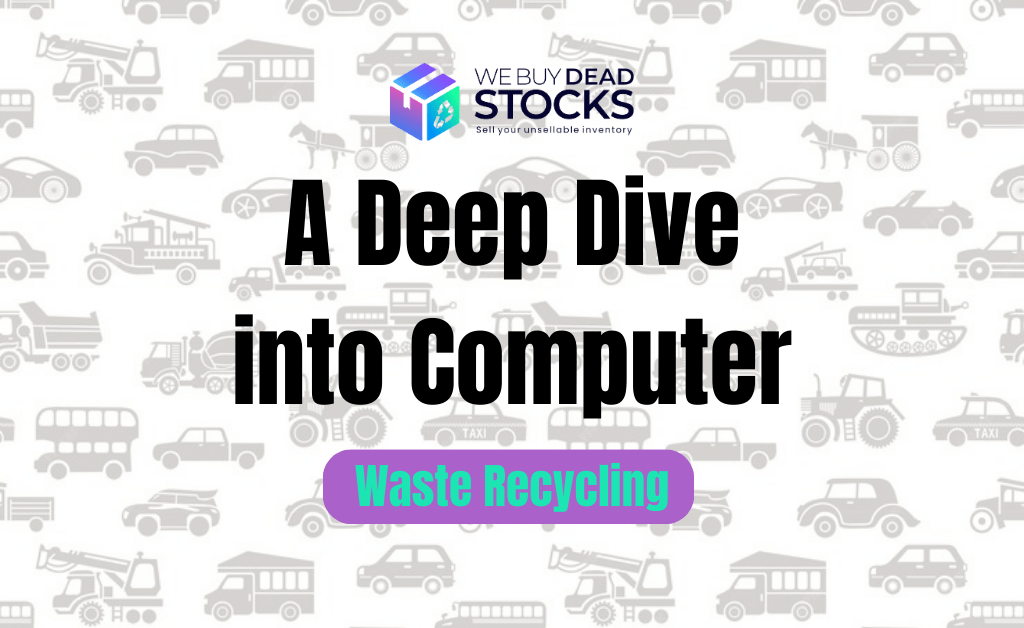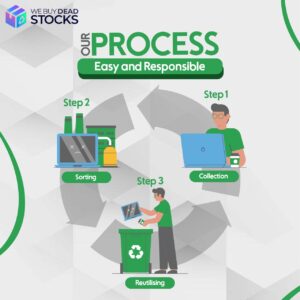In the ever-evolving landscape of technology, our reliance on computers has become more profound than ever before. While the rapid advancements in computing have undoubtedly transformed the way we live and work, they have also given rise to a significant environmental concern – electronic waste. Let’s deep dive into the realm of computer waste recycling, exploring innovative solutions and practices that aim to mitigate the environmental impact of our digital age. From understanding the life cycle of used electronic items to examining the latest advancements in recycling technologies, we delve into the multifaceted dimensions of eco-friendly computing.
The Rise of Electronic Waste
Ever wondered what happens to your old gadgets when you’re done with them? Let’s dive into the world of electronic waste and see why it’s becoming a big deal.
- The Electronic Boom
Did you know that we’re surrounded by more electronic gadgets than ever before? The numbers don’t lie – the production of electronic devices is skyrocketing. From smartphones to laptops, it seems like everyone’s got a gadget in hand.
- The Environmental Sigh
But wait, there’s a downside. Many people don’t realise the impact of tossing out old electronics. When electronic devices end up in the trash, they often find their way to landfills, releasing harmful chemicals into the environment. That’s why considering a used stock buyer is important.
- Computers: Culprits or Saviors?
Computers play a big role in the electronic waste story. As we upgrade to faster and shinier models, what happens to the old ones? Well, they often end up as part of the growing pile of electronic waste. But fear not, there’s hope! Let’s explore how computer waste recycling, used stock buyers, and the market for used electronics items can make a difference.
So, what’s the bottom line? Electronic waste is a real issue, but by being a bit more mindful of what we do with our old gadgets, we can make a positive impact. Consider recycling, selling, or donating your used electronic items. After all, a small change in our habits can lead to a big change for our planet.
Understanding Eco-Friendly Computing
Step into the world of Eco-Friendly Computing, where every action counts! No more waiting – let’s dive straight into the game-changing practices that make a real difference for our planet.
- Embrace Eco-Friendly Computing
Define your tech journey with eco-friendly principles. Choose devices and practices that minimise harm to the environment. Opt for energy-efficient devices and support companies committed to sustainability. It’s time to be intentional about your tech choices.
- Adopt Green Computing Practices
Make it a habit to turn off your computer when not in use. Unplug chargers and peripherals to save energy. Say goodbye to unnecessary printing and embrace digital solutions. By adopting these green computing practices, you’re not just saving resources; you’re making a positive impact on the environment.
- Extend Computer Lifespan
Enough with the constant upgrades! Pledge to extend the lifespan of your computer. Regular maintenance, software updates, and responsible usage can keep your device running smoothly for years. Resist the urge to replace your computer with the latest model – it’s a simple yet powerful way to reduce electronic waste.
Technologies and Innovations in Computer Waste Recycling
Step into the realm of computer waste recycling, where purposeful action meets innovation. Uncover the concrete steps and initiatives shaping a sustainable future for electronic waste management.
Advancements in Recycling Technologies
- Embrace Cutting-edge Separation Techniques
-
-
- Implement and support technologies that enable precise separation of materials from electronic waste.
- Advocate for the adoption of advanced separation methods in recycling facilities.
-
- Invest in Material Recovery Processes
-
-
- Support research and investment in processes that efficiently recover valuable materials from electronic waste.
- Encourage industries to adopt and fund initiatives focused on sustainable material recovery.
-
Emerging Trends in E-Waste Management
- Embrace Circular Economy Models
-
-
- Advocate for circular economy principles in the design and manufacturing of electronic devices.
- Support businesses that prioritise the recycling and repurposing of electronic components.
-
- Champion Refurbishment and Remanufacturing
-
-
- Extend the life of electronic devices by promoting refurbishment and remanufacturing practices.
- Encourage consumers and businesses to choose refurbished electronics over new ones when possible.
-
Case Studies of Successful Eco-Friendly Computing Initiatives
- Corporate Sustainability Initiatives
-
-
- Investigate and replicate successful corporate sustainability models that prioritize eco-friendly computing.
- Advocate for legislation that encourages businesses to adopt environmentally responsible computing practices.
-
- Community-Led Electronic Recycling Drives
-
-
- Organise and participate in community-led electronic recycling events.
- Support local initiatives that provide resources and information on responsible e-waste disposal.
-
Tips for Individuals and Businesses
- Responsible Device Disposal
-
- Action: Recycle your old electronic devices at certified e-waste collection centres.
- Impact: Prevent hazardous materials from entering landfills.
- Choose Sustainable Devices
-
- Action: Prioritise eco-friendly and energy-efficient devices when making new purchases.
- Impact: Support manufacturers committed to sustainability practices.
- Prolong Device Lifespan
-
- Action: Regularly update software, perform maintenance, and avoid unnecessary upgrades.
- Impact: Reduce the frequency of electronic waste generation.
- Educate Others
-
- Action: Share information on responsible e-waste disposal and eco-friendly computing practices.
- Impact: Foster a community committed to sustainable technology use.
For Businesses
- Establish E-Waste Policies:
-
- Action: Develop and implement clear policies for the proper disposal of electronic waste.
- Impact: Ensure responsible practices throughout the organisation.
- Support Employee Education:
-
- Action: Provide training on eco-friendly computing and the importance of responsible e-waste disposal.
- Impact: Create a culture of environmental responsibility within the workplace.
- Partner with Certified Recyclers:
-
- Action: Collaborate with certified e-waste recycling companies for the proper disposal of electronic equipment.
- Impact: Ensure that the business contributes to sustainable waste management practices.
- Optimise IT Asset Management:
-
- Action: Implement efficient IT asset management systems to extend the lifespan of devices.
- Impact: Reduce the frequency of technology turnover and associated waste.
Conclusion:
In the ever-evolving landscape of technology, our choices today determine the environmental legacy we leave for tomorrow. The journey through the complexities of electronic waste management has unveiled not just challenges but actionable solutions. As we conclude this exploration, let’s reaffirm our commitment to a sustainable tech future.
Individuals, armed with knowledge and resolve, can make a difference. By responsibly disposing of old devices, we prevent hazardous materials from infiltrating our ecosystems. Choosing sustainable devices sends a powerful message to manufacturers: prioritise eco-friendly practices.
In every click, every purchase, and every decision, we wield the power to transform the narrative of electronic waste. By embracing sustainable practices, advocating for change, and staying informed, we pave the way for a future where technology and environmental stewardship coexist harmoniously.
Remember, it’s not just about recycling; it’s about redefining our relationship with technology. Let’s make conscious choices, turning each action into a small yet impactful step towards a greener, more sustainable world.





